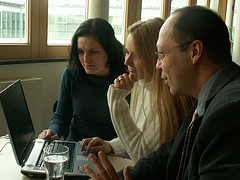TAD292 Art and environment (1976-85) was a distinctive course chaired by Simon Nicholson (1934-1990) who had studied at the Royal College of Art, London, and the University of Cambridge and between 1964 and 1971 taught at the University of Berkeley, California. It sought to develop ‘strategies for creative work’ and it dealt with
the processes and attitudes of art not so much as these were evidenced in products of art but as they underlie the very act of doing art. This can be seen already from the titles which were given to some of the units in the course: ‘Boundary Shifting’, ‘Imagery and Visual Thinking’, ‘Having Ideas by Handling Materials’.
TAD292 students were offered a range of projects on this 30-point course. These included the suggestion that the student stop activity and engage in listening. Another was to compose a score for sounds made from differently textured papers and a third was to enumerate the household’s activities and categorise these in terms of role and sex stereotyping. The aims of the course were attitudional, sensory and subjective rather than cognitive, relating to feeling rather than knowledge. They were ‘more phenomenological than conceptual in nature’. Assessment involved a student not only submitting the product, such as a self-portrait photograph, but also notes describing the process and rationale. The criteria were not specific but involved formulations including enthusiasm, imagination and authenticity. See Philippe C. Duchastel, ‘TAD292 – and its challenge to Educational Technology’, Programmed Learning & Educational Technology, 13, 4, October 1976, pp. 61-66. The course received considerable publicity. In 1976 The World At One, a BBC radio news programme, reported on TAD292 at one summer school:
Bizarre games and happenings formed a part of experimental residential course for a group of students at Sussex University. They were encouraged to make prints of various parts of their bodies. Some made bare bottom prints, other dragged rubbish through the streets and one group appeared to be aimlessly kicking a giant rugby ball about. (more…)
